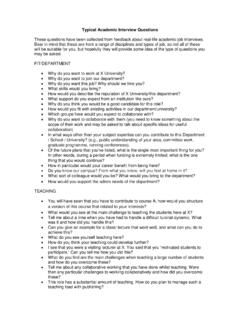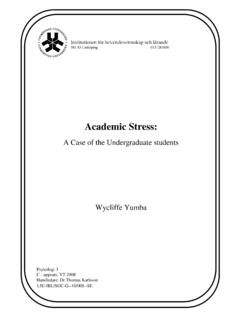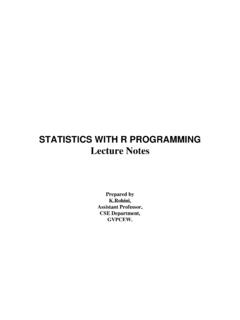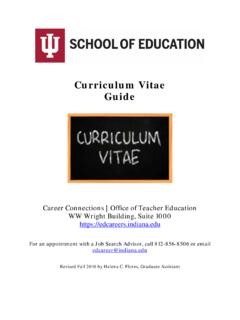Transcription of A guide to CVs, cover letters and application forms
1 Careers A guide to CVs, cover letters and application forms 1. 2. Welcome LSE Careers is here to help you implement your career plans by offering professional support in creating strong applications . Our careers consultants have written this guide with input from employers and common questions asked by LSE students . The first section focuses on identifying your skills and values and what employers are looking for, before starting your job search. The following sections give an overview of CVs, cover letters , and application forms . We recommend reading through each section before you start applying as it will save you time and effort. All examples and advice relate to jobs in the UK. If you need support applying for roles outside the UK or writing a specialised application (like an academic or creative CV) visit our website ( ) or book a one- Contents to-one appointment with a careers consultant.
2 LSE Careers is open all year round and whether you have a clear idea Welcome 3. of what you want to do after your studies or need help to understand your career options and the ways to explore them, we are here to help. Before you start applying 4. We offer seminars on CVs, cover letters , and application forms CVs 10. throughout the year and you can also have your application reviewed in a one-to-one appointment. Browse and book on LSE CareerHub: cover letters 23. application forms 27. Further resources 35. Lizzie Darlington Director, LSE Careers 3. Before you start applying Job applications offer you the opportunity to expand upon who I am very satisfied with the service and help provided by you are and what you have done to demonstrate you fulfil the LSE Careers.
3 I feel that it has already helped me during three Cs: my first months here to develop my career perspective and the competencies to do the job the skills, qualities goals much further. or attributes LSE student the commitment to do the job the energy, drive or enthusiasm Tips for skills auditing the cultural fit to work within the organisation a shared belief in the values pursued by the organisation. Identify transferable skills, ie, skills that can be taken from one job, activity or sector to another Identify your skills Think broadly about the skills you have developed through: academic study You need to be clear about the competencies you have to offer the organisation and job you are applying for. Completing an previous employment application successfully requires you to do more than simply volunteering list your achievements.
4 In order to persuade an employer travelling you are the ideal candidate, you need to prove it with specific student societies evidence and articulate this in a succinct way. other extra-curricular activities eg, hobbies and interests You can find lots of useful self-assessment and matching tools Think about which examples are the most interesting, relevant on our website ( ). You can use these and illustrative of your abilities to the employer. to navigate the career planning process and find the most appropriate information and resources for whatever stage you are at. Conduct a skills audit Below is an example of how a simple skills audit might look but remember this table is not an exhaustive list of skills or examples.
5 The skills required by this organisation Examples demonstrating these skills could Communication including: writing essays, dissertations or articles for the Beaver verbal skills speaking to clients and preparing reports at work non-verbal/body language networking at careers events written skills involvement in mentoring. presentation skills adapting style to the needs of the audience listening skills. 4. The skills required by this organisation Examples demonstrating these skills could Teamwork including: volunteering projects building relationships being a member of a sports team or student society supporting others u ndertaking group projects as part of your degree negotiation skills or at work. setting aims and achieving shared objectives.
6 Leadership and decision-making including: being on the committee of a student society managing conflict making career management decisions in your personal life delegation project management at work sensitivity to others' needs mentoring taking responsibility. volunteering. Problem-solving including: resolving customer complaints identifying or anticipating problems/areas for improvement modifying methodology used in a research project or being flexible when faced with challenges dissertation using logical or lateral thinking to find solutions. designing a simple database to more effectively manage client contacts for a charity, society or small business. Organisation and planning including: planning an overseas trip time and resource management organising an event handling pressure managing a project as part of your degree or at work prioritising activities balancing your study and a part-time job.
7 Meeting deadlines. IT including: social media using software packages in a variety of contexts Word, Outlook, PowerPoint etc. using the internet and email. analysing data using spss , Excel or Stata Dreamweaver, FrontPage, WordPress, Drupal. Creativity including: raising money for charity in an unusual way innovative ideas improving your productivity/motivation, eg, starting a study making improvements. support group with friends solving a problem. 5. The skills required by this organisation Examples demonstrating these skills could Numeracy including: identifying patterns in data for academic projects descriptive statistical skills practical experience on an internship inferential statistical skills handling stock or cash at work.
8 Budgeting. Commercial awareness including: keeping up to date with the FT, Economist, websites, social having an understanding of the marketplace and competitors media etc. to analyse current affairs and relate them to the particular organisation or role being able to predict future trends involvement in entrepreneurship ventures, eg, LSE Generate identifying new opportunities competitions and awards: effectively promoting products/services assisting customers and closing sales in a part-time retail job. thinking strategically beyond the boundaries of the immediate team. Personal qualities including: demonstrating a can do attitude and not being easily reliability deterred or demoralised proactivity standing in for a colleague at a meeting.
9 Self-motivation adaptability/flexibility. Conduct a values audit This is an example of a simple values audit. Use it as a starting point to identify what really motivates you and whether the organisation and job you are applying for is a good match. Things that motivate me What does the job/organisation offer? Learning new things and variation in-house training courses? opportunities for secondments? Sociable working environment open-plan working environment? coaching and mentoring networks? Working on written projects report writing for senior management and media? opportunity to contribute to professional journals and in-house publications? responsibility for departmental website? Time off to pursue outside interests/ adequate annual leave?
10 Spend time with family flexible working hours? typical working week of 35 hours? 6. What employers are looking for Investigate the organisation's main competitors. Also consider developments within the sector, for example changes in the Most applicants find it relatively easy to complete their law or the merger of two competitors and the potential impact. personal details and qualifications but lose inspiration when they are asked to write about themselves in more depth. Attending employer presentations, careers fairs, and open days Often this is because they don't know enough about the will provide you with opportunities to network with current organisation, the job or their own skills to begin constructing employees.















